Compare Electricity Plans
Compare latest electricity plans and prices.
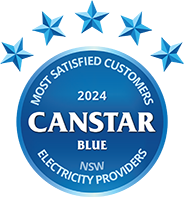
Red Energy has again topped Canstar Blue’s customer satisfaction ratings for electricity providers in NSW – an award the retailer has now claimed for 11 years running. Red Energy achieved a five-star score for every category this year. These categories are: overall satisfaction, value for money, customer service, bill and cost clarity, ease of sign-up and online tools and advice.
This year, more than 2,400 bill-payers across the state have given us feedback on their electricity provider, based on criteria including customer service, bill and cost clarity, online tools and advice, ease of sign-up and value for money.
The idea is to give you, the consumer, as much information about the compared providers as possible, to help you make a more informed decision. Keep in mind though that while our ratings include six of the most prominent electricity retailers in NSW, you may find others operating in your area.
Canstar Blue surveyed 2,464 New South Wales households for their feedback on their energy retailer. Respondents had to live in NSW, have an electricity account and pay the bills for their response to be eligible.
Respondents rate their satisfaction with their electricity provider from zero to 10, where zero is extremely dissatisfied and 10 is extremely satisfied. Provider satisfaction was rated by respondents on the following criteria:
The winning brand is the one that receives the highest overall satisfaction rating once all the scores from the overall satisfaction criteria are combined and averaged.
Brands must have received at least 30 responses to be included, so not all brands available in the market have been compared in this survey. The brands rated in this survey are listed below in order of best overall satisfaction.
Best NSW electricity providers:
Red Energy tops the table for the eleventh year in a row – a massive endorsement by its customers, particularly after several years of energy market volatility. Although this doesn’t mean that Red Energy is the cheapest provider in NSW, it does indicate that its customers are the most satisfied with the overall level of service they receive.
Alinta Energy trailed closely behind when it came to overall satisfaction, earning four stars, followed by AGL, Origin Energy and EnergyAustralia. Dodo was awarded three stars for overall satisfaction.
Find more detailed information on our ratings methodology.
Here are some of the cheapest published deals from the retailers on our database that include a link to the retailer’s website for further details. These are products from referral partners†. These costs are based on the Ausgrid network in Sydney but prices may vary depending on your circumstances. This comparison assumes general energy usage of 3900kWh/year for a residential customer on a single rate tariff. Please use our comparison tool for a specific comparison in your area and to see other products in our database that may be available. Our database may not cover all deals in your area. As always, check all details of any plan directly with the retailer before making a purchase decision.
On the hunt for a good electricity deal in NSW? Check out our guide to deals, plans and prices below.
Here are some of the cheapest published deals from the retailers on our database that include a link to the retailer’s website for further details. These are products from referral partners†. These costs are based on the Ausgrid network in Sydney but prices may vary depending on your circumstances. This comparison assumes general energy usage of 3900kWh/year for a residential customer on a single rate tariff. Please use our comparison tool for a specific comparison in your area and to see other products in our database that may be available. Our database may not cover all deals in your area. As always, check all details of any plan directly with the retailer before making a purchase decision. The next three tabs feature products exclusively from AGL, EnergyAustralia and Origin.
Here are the AGL Energy plans on our database for NSW. These are products from a referral partner†. These costs are based on the Ausgrid network in Sydney but prices may vary depending on your circumstances. This comparison assumes general energy usage of 3900kWh/year for a residential customer on a single rate tariff. Please use our comparison tool for a specific comparison in your area and to see other products in our database that may be available. Our database may not cover all deals in your area. As always, check all details of any plan directly with the retailer before making a purchase decision.
Here are the EnergyAustralia plans on our database for NSW. These are products from a referral partner†. These costs are based on the Ausgrid network in Sydney but prices may vary depending on your circumstances. This comparison assumes general energy usage of 3900kWh/year for a residential customer on a single rate tariff. Please use our comparison tool for a specific comparison in your area and to see other products in our database that may be available. Our database may not cover all deals in your area. As always, check all details of any plan directly with the retailer before making a purchase decision.
Here are the Origin Energy plans on our database for NSW. These are products from a referral partner†. These costs are based on the Ausgrid network in Sydney but prices may vary depending on your circumstances. This comparison assumes general energy usage of 3900kWh/year for a residential customer on a single rate tariff. Please use our comparison tool for a specific comparison in your area and to see other products in our database that may be available. Our database may not cover all deals in your area. As always, check all details of any plan directly with the retailer before making a purchase decision.

Red Energy is the best-rated electricity provider in our review for the eleventh consecutive year. The retailer was awarded five stars in all key research categories. It scored five stars for overall satisfaction, value for money, customer service, bill and cost clarity, ease of sign-up and online tools and advice.
Owned by renewable energy generation company Snowy Hydro, Red Energy operates across NSW, Victoria, Queensland, South Australia and the Australian Capital Territory. The retailer offers a selection of unique market offers, with most plans featuring variable rates, but no lock-in contracts or exit fees. Aside from great customer service, Red Energy’s biggest selling point is its partnership with Qantas, which sees customers pocket two Frequent Flyer points for every dollar on their bill that’s paid on time.
Here are the Red Energy plans on our database for NSW. These are products from a referral partner†. These costs are based on the Ausgrid network in Sydney but prices may vary depending on your circumstances. This comparison assumes general energy usage of 3900kWh/year for a residential customer on a single rate tariff. Please use our comparison tool for a specific comparison in your area. Our database may not cover all deals in your area. As always, check all details of any plan directly with the retailer before making a purchase decision.
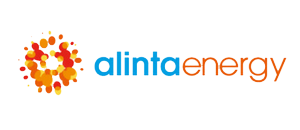
Alinta Energy recorded four stars for its overall satisfaction, value for money, customer service, bill and cost clarity, ease of sign-up and online tools and advice.
A major gas and electricity retailer in NSW, VIC, SA, QLD and Western Australia, Alinta Energy is owned by Hong Kong’s Chow Tai Fook Enterprises, but is still headquartered in Sydney. Alinta focuses on offering competitive rates, making it one of the leading challengers to the big three (AGL, Origin and EnergyAustralia). Alinta Energy’s rewards program also offers exclusive customer perks, such as discounts on movie tickets, electronics and more.
Here are the Alinta Energy plans on our database for NSW. These are products from a referral partner†. These costs are based on the Ausgrid network in Sydney but prices may vary depending on your circumstances. This comparison assumes general energy usage of 3900kWh/year for a residential customer on a single rate tariff. Please use our comparison tool for a specific comparison in your area. Our database may not cover all deals in your area. As always, check all details of any plan directly with the retailer before making a purchase decision.

AGL was awarded four stars for its overall satisfaction, customer service, bill and cost clarity and ease of sign-up. It scored three stars for value for money but earned five stars for online tools and advice.
AGL offers a small selection of market contracts in NSW, with variable rates and a range of value-add incentives, such as a Netflix subscription with its aptly named Netflix Plan. The company also offers its own rewards program called AGL Rewards, which brings various discounts and savings on gift cards, plus money off movie tickets and restaurant meals. AGL also offers a specific solar plan to customers with solar panels, as well as a dedicated AGL seniors plan for eligible customers with a Seniors Card.
Here are the AGL plans on our database for NSW. These are products from a referral partner†. These costs are based on the Ausgrid network in Sydney but prices may vary depending on your circumstances. This comparison assumes general energy usage of 3,900kWh/year for a residential customer on a single rate tariff. Please use our comparison tool for a specific comparison in your area. Our database may not cover all deals in your area. As always, check all details of any plan directly with the retailer before making a purchase decision.
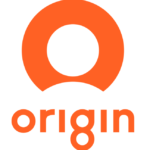
Origin was rated four stars for overall satisfaction, customer service, bill and cost clarity, ease of sign-up and online tools and advice. It scored three stars for value for money.
Origin is a retailer servicing NSW, VIC, SA, QLD and the ACT. It offers a variety of variable rate plans, most of which come with a 12-month benefit period, and even throws in bonus Everyday Rewards points on its Everyday Rewards Variable plan. All plans come with no exit fees or lock-in contracts. Origin is also one of Australia’s leading solar retailers, with two specific plans for customers who own solar panels.
Here are the Origin Energy plans on our database for NSW. These are products from a referral partner†. These costs are based on the Ausgrid network in Sydney but prices may vary depending on your circumstances. This comparison assumes general energy usage of 3900kWh/year for a residential customer on a single rate tariff. Please use our comparison tool for a specific comparison in your area. Our database may not cover all deals in your area. As always, check all details of any plan directly with the retailer before making a purchase decision.

EnergyAustralia took out four stars for overall satisfaction, customer service, bill and cost clarity, ease of sign-up and online tools and advice. It was awarded three stars for value for money.
EnergyAustralia provides customers with a range of market offers, with its most heavily marketed plans providing reasonable usage and supply rates. Its plans avoid exit fees and lock-in contracts, and conditional discounts and credits are often available. The retailer also offers a standing offer plan, which sits equal to the reference price, and a solar-specific plan with a higher feed-in tariff.
Here are the EnergyAustralia plans on our database for NSW. These are products from a referral partner†. These costs are based on the Ausgrid network in Sydney but prices may vary depending on your circumstances. This comparison assumes general energy usage of 3900kWh/year for a residential customer on a single rate tariff. Please use our comparison tool for a specific comparison in your area. Our database may not cover all deals in your area. As always, check all details of any plan directly with the retailer before making a purchase decision.

Dodo Power and Gas claimed three stars for overall satisfaction, along with three stars for value for money, customer service, bill and cost clarity, ease of sign-up and online tools and advice.
Owned by the Vocus Group, Dodo Power and Gas is perhaps best-known as a phone and internet provider, but also sells electricity and gas. Dodo operates across most eastern states, with a single variable rate market offer with lower rates than the reference price. Its big selling point is that customers have the convenience of dealing with just one company for all their home services, and can save up to $10 per month on internet plans by bundling with Dodo energy.
Here are the Dodo plans on our database for NSW. These are products from a referral partner†. These costs are based on the Ausgrid network in Sydney but prices may vary depending on your circumstances. This comparison assumes general energy usage of 3900kWh/year for a residential customer on a single rate tariff. Please use our comparison tool for a specific comparison in your area. Our database may not cover all deals in your area. As always, check all details of any plan directly with the retailer before making a purchase decision.
To get the cheapest possible deal for your household, you will need to take into consideration the following factors:
When you spell everything out like this, it’s easy to see why many consumers find the subject of energy confusing. To simplify matters, Canstar Blue’s price comparison report for NSW shows overall estimated prices for the power suppliers mentioned in this report. Based on average usage figures and market contract pricing for single rate tariff households on the Ausgrid network, we show that customers could save hundreds of dollars by switching to one of the cheapest offers available. The ‘cheapest’ doesn’t automatically mean best, but if the bottom line is all you worry about then our report is certainly worth a look.
Ultimately, it’s about educating yourself on the options available to you. Retailers are required by law to publish all their energy price fact sheets online, so use the information gathered in this report and check out the facts and figures with your own eyes. Our customer ratings also offer you an insight into how the big brands in the state are performing in the eyes of those paying the bills, so be sure to keep these details in mind too.
While prices change all the time, the likes of GloBird Energy, Engie and Dodo are consistently some of the cheapest retailers in NSW. However, with more than 20 companies operating across the state, finding the cheapest energy provider will require some research on your behalf.
It’s also important to not overlook other features offered by electricity companies, such as customer service, billing options, value-add incentives and rewards programs. Although price will generally have the biggest influence when making a decision, it is worth knowing which brands go that little bit further for your business.
It now only takes two business days to switch energy providers and transfer your account to a new retailer. Under revised rules, your old electricity provider will have 48 hours to finalise your account using an estimated bill, before sending your details to your new provider.
The entire switching process is usually handled online or over the phone in a matter of minutes, with all the paperwork taken care of by your new retailer.

Katrina Hasdell is an Energy Content Producer at Canstar Blue, where she covers Australia’s retail energy market. Katrina is dedicated to providing consumers with easy-to-read information on their energy options so they can get better deals on electricity, solar power and more.
You can follow Katrina on LinkedIn.

Samantha Mauro-Todd is Canstar Blue’s Consumer Research Specialist, coordinating the consumer research program behind our customer satisfaction awards across Canstar and Canstar Blue in Australia and New Zealand. Sam has earned a Bachelor of Business (Marketing) from Griffith University and, with seven years in market research and two years in marketing, she is experienced in survey design, implementation and analysis, coupled with an understanding of marketing principles and best practice.
The list below features all the electricity providers that currently list plans in NSW.
Find out which brands are available in your area by using our free comparison tool. Please note that some of these companies only operate in certain areas. Other brands may also be available in your area.
You may not realise that there are three different electricity distribution networks covering NSW. This is important to know because the network you live on could have a big impact on your bills, with distribution costs accounting for as much as 50% of your overall bills. The three distribution networks are:
Retailers will have different prices for their plans on each network, meaning that the amount an Origin customer (for example) pays on the Ausgrid network will be different from what an Origin customer will pay on the Endeavour network, even if their plans are the same. As a homeowner, there is little you can do about this. However, if you are renting a home and take utility costs seriously, you could look into different prices before deciding which suburb to move to, because it could save you a significant amount.
NSW may be behind other parts of the country when it comes to the uptake of solar power, but power suppliers in the state still offer some of the most generous feed-in tariffs. Rates of up to 10c/kWh are on offer for exported energy, but be aware that the highest feed-in tariffs do not necessarily translate to the cheapest overall bills. When comparing solar plans, it’s important to pay as much attention to the usage and supply charges as the feed-in tariff being offered.
If conditional discounts don’t really appeal to you, you will find a range of other sign-up incentives offered by retailers in NSW. AGL has a plan with an included Netflix Basic subscription, while those with Red Energy can collect Qantas Frequent Flyer points for paying their bills on time. It’s also common for companies to throw an occasional $50-$100 in sign-up credit at new customers, especially if they sign up online.
The following electricity providers offer some form of rewards program to customers in NSW, bringing savings on various leisure and social activities, including eating out, accommodation and even theme park tickets.
To help reduce utility costs, there are a range of different energy rebates available for households in Sydney and surrounding areas. Customers with low incomes, dependent children and certain medical conditions could be eligible for financial support towards their gas and electricity costs.
There are many power retailers in operation now, but it wasn’t long ago that households in Sydney and the rest of the state were stuck with one of the big three companies – Origin, EnergyAustralia or AGL – with no other brands able to challenge their dominance. It’s for this reason that they continue to supply almost 80% of customers in NSW, according to the Australian Energy Regulator. If you don’t remember signing up for one of these companies, you were probably transferred over when one of them absorbed your old retailer.
The NSW electricity market began to change in 2002 when the State Government introduced Full Retail Competition, meaning that smaller retailers could provide alternative options for consumers. However, while Victoria lifted its pricing restrictions way back in 2009 – and South Australia followed suit three years later – the NSW retail market remained regulated by the state’s Independent Pricing and Regulatory Tribunal until 2014, so there was little or no financial incentive for customers to switch before then. This was a story replicated in Queensland where price regulations were only lifted in 2016.
Electricity price deregulation means the power companies are free to set their own plans, prices and conditions – resulting in a plethora of new entrants into the market. The benefits of deregulation are still up for debate, but the fact is that households have never had so many providers to choose from, presenting the opportunity for consumers to save if they shop around, or just use new offers as leverage to negotiate a better deal with their existing supplier. However, in order to save, you must have at least a basic understanding of the different providers, contracts and plans available.
In July 2019, energy retailers in NSW had to adapt to a range of new industry regulations designed to make power more affordable and make comparing plans easier. This was when the Australian Competition and Consumer Commission (ACCC) stepped in to introduce a new, regulated price cap for customers who were previously paying the most. These customers, on standing offers, were switched onto a new Default Market Offer (DMO) price determined by the Australia Energy Regulator (AER). This is a consistent price across all retailers. The DMO also acts as a reference price for all market offers, including those with discounts. All plans must now be compared to the AER Reference Price, displaying a percentage less than, equal to or more than, so consumers can see which plans really offer the best value.
NSW is home to more than a dozen solar farms, contributing significantly to the state’s power supply. Yet the state remains dependent on a handful of coal-fired power plants to meet its power demand. Most of these stations are owned by the big three companies – AGL, Origin, and EnergyAustralia.
Here are the previous winners of Canstar Blue’s Electricity Providers – NSW Customer Satisfaction Award:

Best-Rated Electricity Providers NSW - June 26th
Looking to save on your monthly power bill? In this article, Canstar Blue compares single rate vs time of use energy tariffs.
– Read more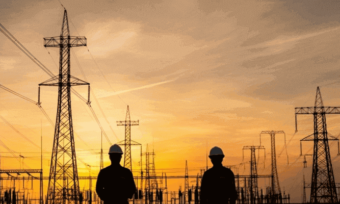
Best-Rated Electricity Providers NSW - June 20th
Canstar Blue reviews energy offers from retailers including Origin Energy, Engie, Alinta Energy and Red Energy.
– Read more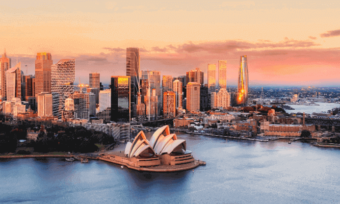
Best-Rated Electricity Providers NSW - June 16th
Compare electricity prices, plans and discounts from energy providers in Sydney, NSW with Canstar Blue.
– Read more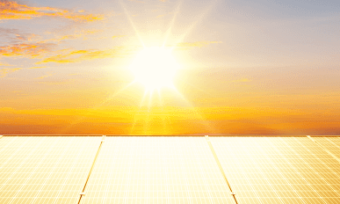
Best Solar Electricity Providers - June 3rd
Which solar provider offers the best solar Feed-in Tariff? In this article, Canstar Blue compares solar FiTs in each state.
– Read more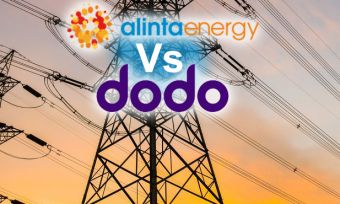
Best-Rated Electricity Providers NSW - June 3rd
Canstar Blue compares electricity rates and prices from Alinta Energy and Dodo to see which retailer provides better value for customers.
– Read more*NSW, QLD and SA: Price is GST inclusive and is: The estimated lowest possible price a representative customer would be charged in a year for this plan, assuming all conditions of discounts offered (if any) have been met, based on the AER’s model annual usage in the distribution region as stated at the top of each table.
~VIC: Price is GST inclusive and is: The estimated lowest possible price a customer would be charged in a year for this plan, using the Victorian Government’s annual reference consumption for domestic customers in your distribution region as stated at the top of each table and assuming all conditions of discounts offered (if any) have been met.
ACT: Price is GST inclusive and is: The estimated lowest possible price a representative customer would be charged in a year for this plan, using the Independent Competition and Regulatory Commission (ICRC) annual reference consumption for domestic customers in your distribution region as stated at the top of each table and assuming all conditions of discounts offered (if any) have been met.
TAS: The price shown is inclusive of GST and is the estimated lowest possible price a representative customer would be charged in a year for this plan, assuming all conditions of discounts offered, if any, have been met. The general usage for products displayed in the table for Tasmanian postcodes is based on the median electricity usage of customers in Tasmania. The median usages are: 2,947 kWh/year for a Single Rate tariff, and 7,428 kWh/year for a Single Rate + Controlled Load tariff. These usage assumptions are based on the latest Typical Electricity Customers in Tasmania report released by the Office of the Tasmanian Economic Regulator. If the amount of electricity you actually use differs greatly from this estimate, your bill could be significantly larger or smaller than the charges listed for each plan.
Some plans may require you to meet certain conditions before a discount may become available to you. Check the energy provider’s plan information for details of all possible discounts that may apply and any conditions that need to be met to be eligible for these discounts. Some plans may have a minimum term longer than one year. In that case the total cost over the term will be much higher than the price (which is only for one year). Consider the provider’s detailed product and pricing information before making a decision to take out a new plan or switch electricity providers.
^What is the Reference Price?
The reference price is set by the Australian Energy Regulator (AER) for a financial year in relation to electricity supply to residential customers in the distribution region and is based on an assumed annual usage amount. Any difference between the reference price and the unconditional price of a plan is expressed as a percentage more or less than the reference price. The terms of any conditional discounts are shown, along with any further difference between the reference price and the discount applied if a condition is met, expressed as a percentage more or less than the reference price.
>What is the VDO?
The Victorian Default Offer (VDO) includes a daily supply charge and usage charges (per kilowatt hour). Differences in tariffs across distribution regions reflect the unique costs of providing electricity services in each area. The difference between the VDO and the unconditional price of a plan, based on the Victorian Government’s annual reference consumption for domestic customers in the distribution region, is expressed as a percentage more or less than the VDO. The terms of any conditional discounts are shown, along with any further difference between the VDO and the discount applied if a condition is met, expressed as a percentage more or less than the VDO.
Solar Products:
Annual cost estimates exclude solar payments. Feed-in tariffs shown are single rate only. Solar products may only be available to solar customers and some products may only be available to customers who purchase solar PV or other products through the retailer.
Referral Partners
†By clicking on a brand, 'go to site', 'shop online', 'get quotes now', or 'see offer' button, you will leave Canstar Blue and be taken to our referral partner to compare. Canstar Blue may be paid for this referral. You agree that Canstar Blue’s terms and conditions apply to this referral. Please note that references to an 'offer' do not mean that you will automatically be accepted or eligible for a product, eligibility requirements may apply.
Canstar Blue may earn a fee for referrals from its website tables, and from sponsorship of certain products. Fees payable by product providers for referrals and sponsorship may vary between providers, website position, and revenue model. Sponsorship fees may be higher than referral fees. Sponsored products are clearly disclosed as such on website pages. They may appear in a number of areas of the website such as in comparison tables, on hub pages and in articles. Sponsored products may be displayed in a fixed position in a table, regardless of the product's rating, price or other attributes. The table position of a Sponsored product does not indicate any ranking or rating by Canstar. The table position of a Sponsored product does not change when a consumer changes the sort order of the table. For more information please see How Are We Funded.
